中考英语动词时态、语态、
初中英语动词时态及语态
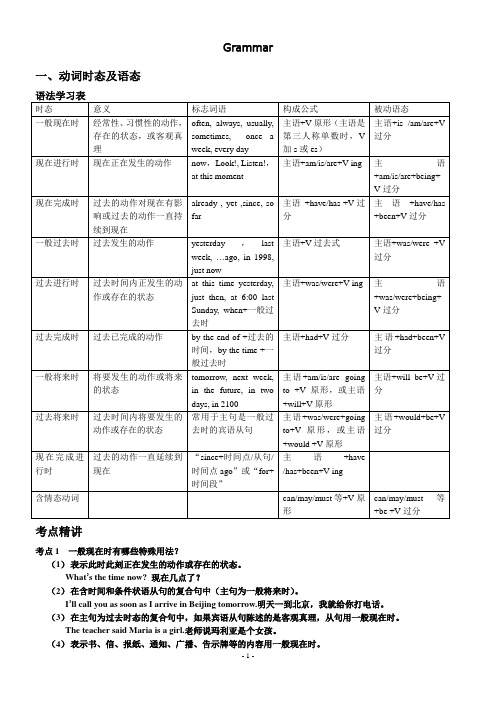
Grammar一、动词时态及语态语法学习表时态意义标志词语构成公式被动语态一般现在时经常性、习惯性的动作,存在的状态,或客观真理often, always, usually,sometimes, once aweek, every day主语+V原形(主语是第三人称单数时,V加s或es)主语+is /am/are+V过分现在进行时现在正在发生的动作now,Look!, Listen!,at this moment 主语+am/is/are+V-ing 主语+am/is/are+being+V过分现在完成时过去的动作对现在有影响或过去的动作一直持续到现在already , yet ,since, sofar主语+have/has +V过分主语+have/has+been+V过分一般过去时过去发生的动作yesterday ,lastweek, …ago, in 1998,just now 主语+V过去式主语+was/were +V过分过去进行时过去时间内正发生的动作或存在的状态at this time yesterday,just then, at 6:00 lastSunday, when+一般过去时主语+was/were+V-ing 主语+was/were+being+V过分过去完成时过去已完成的动作by the end of +过去的时间,by the time +一般过去时主语+had+V过分主语+had+been+V过分一般将来时将要发生的动作或将来的状态tomorrow, next week,in the future, in twodays, in 2100主语+am/is/are goingto +V原形,或主语+will+V原形主语+will be+V过分过去将来时过去时间内将要发生的动作或存在的状态常用于主句是一般过去时的宾语从句主语+was/were+goingto+V原形,或主语+would +V原形主语+would+be+V过分现在完成进行时过去的动作一直延续到现在“since+时间点/从句/时间点ago”或“for+时间段”主语+have/has+been+V-ing含情态动词can/may/must等+V原形can/may/must等+be +V过分考点精讲考点1 一般现在时有哪些特殊用法?(1)表示此时此刻正在发生的动作或存在的状态。
初中英语语法专项8动词的时态和语态

【中考考点】
(1)动词的第三人称单数形式、过去式、过去分词和现在分词的构成。 (2)动词的八种时态的基本结构及用法。 (3)动词的被动语态的基本结构及用法。 (4)动词的主动形式表示被动意义的用法。
动词的时态
考点一 一般现在时
1.结构 一般现在时主要用动词原形表示(当主语是第三人称单数时,谓语动词用第三人称单数形式)。 2.动词的第三人称单数形式变化规则 (1)直接加-s。如:work—works (2)以“辅音字母+y”结尾的词,先变y为i,再加-es。如:carry—carries, cry—cries, try—tries, study—studies (3)以s, x, o, ch, sh结尾的词加-es。如: pass—passes, fix—fixes, go—goes, do—does, teach—teaches, wash—washes (4)特殊:have—has, are—is
动词的时态
考点四 过去将来时
1.结构 would+动词原形 was/were+going to+动词原形 2.用法 表示从过去的某一时刻看,将要发生的动作。 His uncle said that there would be a good harvest the next year.他叔叔说第二年会有一个 好收成。 【注意】 在由if引导的条件状语从句中,如果主句用过去将来时,那么if从句需用一般过去时代替过 去将来时。 If he were here, he would show us how to do it. 如果他在这儿,他就会向我们展示该如何做。
动词的时态
4.动词过去式的变化规则 (1)一般情况下,在动词原形后加-ed。如: watch—watched (2)以不发音的字母e结尾的加-d。如:live—lived (3)以“辅音字母+y”结尾的,变y为i,再加-ed。如: study—studied, carry—carried, cry—cried (4)以重读闭音节结尾,且末尾只有一个辅音字母的,先双写该辅音字母,再加-ed。如: stop—stopped, plan—planned, prefer—preferred (5)不规则动词的过去式需特殊记忆。
中考时态知识点归纳
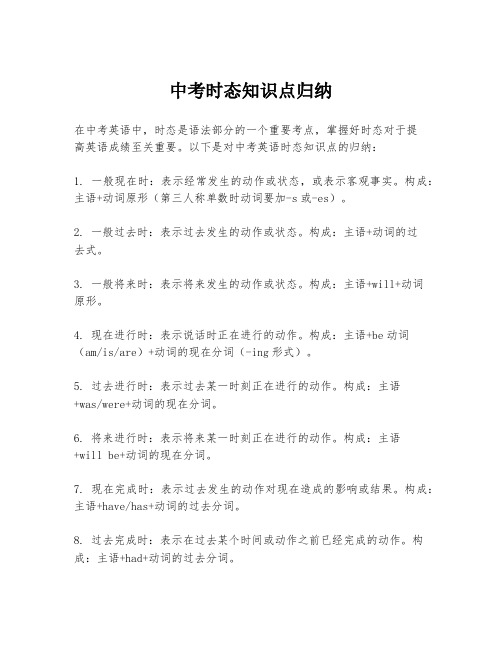
中考时态知识点归纳在中考英语中,时态是语法部分的一个重要考点,掌握好时态对于提高英语成绩至关重要。
以下是对中考英语时态知识点的归纳:1. 一般现在时:表示经常发生的动作或状态,或表示客观事实。
构成:主语+动词原形(第三人称单数时动词要加-s或-es)。
2. 一般过去时:表示过去发生的动作或状态。
构成:主语+动词的过去式。
3. 一般将来时:表示将来发生的动作或状态。
构成:主语+will+动词原形。
4. 现在进行时:表示说话时正在进行的动作。
构成:主语+be动词(am/is/are)+动词的现在分词(-ing形式)。
5. 过去进行时:表示过去某一时刻正在进行的动作。
构成:主语+was/were+动词的现在分词。
6. 将来进行时:表示将来某一时刻正在进行的动作。
构成:主语+will be+动词的现在分词。
7. 现在完成时:表示过去发生的动作对现在造成的影响或结果。
构成:主语+have/has+动词的过去分词。
8. 过去完成时:表示在过去某个时间或动作之前已经完成的动作。
构成:主语+had+动词的过去分词。
9. 将来完成时:表示将来某个时间之前已经完成的动作。
构成:主语+will have+动词的过去分词。
10. 现在完成进行时:表示从过去某一时间开始,一直持续到现在,并且可能还要继续下去的动作。
构成:主语+have/has been+动词的现在分词。
11. 过去完成进行时:表示在过去某一时间之前开始,一直持续到过去某一时间的动作。
构成:主语+had been+动词的现在分词。
12. 被动语态:表示动作的承受者而非执行者。
被动语态的构成根据时态不同而变化,一般形式为:be动词的各种时态形式+动词的过去分词。
掌握这些时态的构成和用法,对于理解和运用英语时态至关重要。
在复习时,可以通过做练习题、阅读例句和进行实际对话来加深理解。
同时,注意时态之间的转换和使用场合,以确保在中考中能够准确无误地使用各种时态。
结束语:通过上述的归纳,希望同学们能够对中考英语中的时态有一个清晰的认识和掌握,为中考取得优异成绩打下坚实的基础。
2023年英语中考语法总复习—8.动词时态和语态
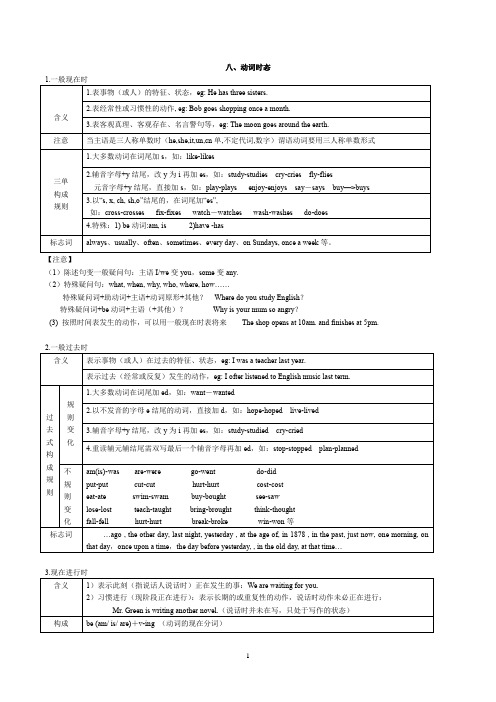
八、动词时态【注意】(1)陈述句变一般疑问句:主语I/we变you,some变any.(2)特殊疑问句:what, when, why, who, where, how……特殊疑问词+助动词+主语+动词原形+其他?Where do you study English?特殊疑问词+be动词+主语(+其他)?Why is your mum so angry?(3) 按照时间表发生的动作,可以用一般现在时表将来The shop opens at 10am. and finishes at 5pm.【注意】(1)always也可用于现在进行时,表示一种强烈的感情色彩,译为“总是”He is always telling lies.(2)某些特殊动词不能用于现在进行时。
① have当“有”讲时,不能用现在进行时。
I have two books now.②“belong to” The two people belong to me now.③表示“心理活动/状态/感觉”的词I want a dog now.① be going to主要用于:主观判断(1)表示事先经过考虑、安排好打算要做的事情:I’m going to play the violin.(2)表示根据目前某种迹象判断,某事非常有可能发生(有迹象表明要发生的事)。
Look!There come the dark clouds. It is going to rain.② will主要用于:(1)客观上将来势必发生的事情, 未经事先考虑, 临时决定的They will go to visit the factory tomorrow.(2)表示不以人的意志为转移的自然发展的未来的事:Today is Saturday. Tomorrow will be Sunday.(3)表意愿。
问对方是否愿意做某事或表示客气地邀请或命令:Will you please turn on the radio?(1) have/has been to “去过已回”She has been to Japan twice.have/has gone to. “去了未回”Where is your twin sister? She has gone to Japan.have/has been in “待在某地” She has been in Japan for 2 years. (2) 动词从词义上可以分为延续性和非延续性两种。
初中英语人教版 中考 语法专题 10 动词的时态和语态
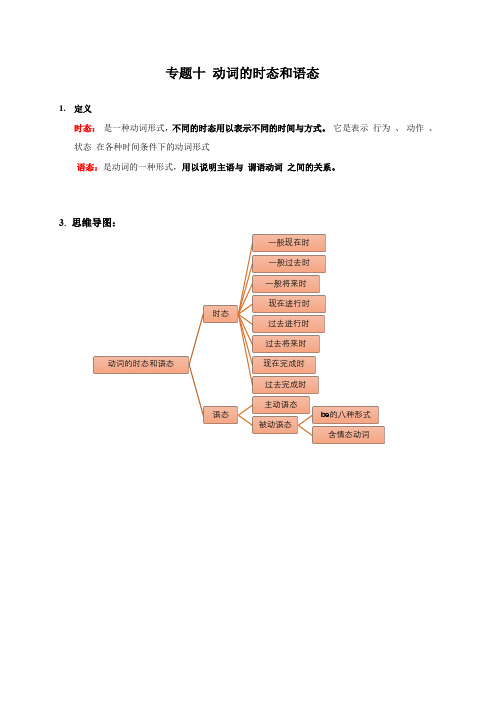
专题十动词的时态和语态1.定义时态:是一种动词形式,不同的时态用以表示不同的时间与方式。
它是表示行为、动作、状态在各种时间条件下的动词形式语态:是动词的一种形式,用以说明主语与谓语动词之间的关系。
3. 思维导图:动词的时态和语态时态一般现在时一般过去时一般将来时现在进行时过去进行时过去将来时现在完成时过去完成时语态主动语态被动语态be 的八种形式含情态动词1.动词的时态1.常考的时态构成及用法a.一般现在时d.现在进行时e.过去进行时f.过去将来时g.现在完成时h.过去完成时2. 动词的语态a. 分类:主动语态:表示主语是动作的执行者被动语态:表示并语是动作的执行者c.主动语态和被动语态的转换规则典型例题总分:50分姓名:得分:1.单选题(每小题1分,共50分)( ) 1. Jenny, together with the Greens the White Tower Park if it tomorrow.A.are going to; isn't rainyB.is going to; doesn't rainC.are going to; won't rainD.is going to; isn't rain( ) 2. The old man for quite some time.A.has diedB.dieC.has deadD.has been dead( ) 3. It is reported that a tall building in the city next year.A.will be builtB.were buildC.have builtD.will build( ) 4. My sister for 2 years.A.has marriedB.have got marriedC.has been marriedD.married( ) 5. Chinese ________in many schools around the world and many people love to learn it.A.teachesB.is teachingC.has taughtD.is taught( ) 6. When Tom was in primary school, he ________the piano every day.A.playsB.playedC.was playingD.has played( ) 7. A baby's first month birthday is a special event in China and _____with a special Party.A.celebratesB.is celebratedC.was celebratedD.will celebrate( ) 8. -Were you at home at 9 o'clock last night?-Yes, I a shower at that time.A.tookB.was takingC.was takenD.am taking( ) 9. National Day celebrations for China's seventieth birthday in about three months.A.will be heldB.will holdC.is heldD.was held( ) 10. We don't know if he tomorrow. If he, I will call youA.will come, will comeB.will come, comeses, will comees, comes( ) 11. He told me that he ______ his uncle in Thailand the next day.A.will visitB.has visitedC.is going to visitD.would visit( ) 12. -Tom, do you know ________? -In Beijing.A.where will the 24th Winter Olympics be heldB.where the 24th Winter Olympics will holdC.where the 24th Winter Olympics will be heldD.where will the 24th Winter Olympics hold( ) 13. Peter with his classmates ________ for the bus when the earthquake happened.A.is waitingB.was waitingC.are waitingD.were waiting( ) 14. his museum ________ here for over 80 years. It ________ one of the oldest buildings in this city.A.is; wasB.had been; isC.was; has beenD.has been; is( ) 15. -Mrs. Brown, how long can books from the school library ?-At most two weeks.A.borrowB.keepC.be borrowedD.be kept( ) 16.-An AI robot _____in our school dining hall next term.-I'm looking forward to it.A.will useB.will be usedC.is usedD.was used( ) 17. Usually a baby's face ____ smooth.A.is feelingB.feltC.feels likeD.feels( ) 18. She _____ an English magazine when I came in.A.readsB.has readC.will readD.was reading( ) 19. I will call you as soon as he______ here.A.arriveB.will arriveC.arrivesD.arrived( ) 20. Boys and girl, ______ learning and have fun!A.keepB.to keepC.keepingD.kept( ) 21. There ______a basketball game between these two grades in the gym this afternoon.A.willB.is going to haveC.is going to beD.will have( ) 22. We ______TV from seven to nine last night.A.were watchingB.will watchC.watchedD.watch( ) 23. Jack's mother taught me how ________ Yunnan rice noodles last weekend.A.to makeB.makingC.makeD.to making( ) 24. Mrs. Green said the plates ________ right away,or they would become difficult to wash.A.will be washedB.should washC.will washD.should be washed( ) 25. The documentary Under the Dome (《苍穹之下》)which ________ by Chai Jing showed us that the air pollution in China was very serious.A.producesB.producedC.is producedD.was produced( ) 26. -What did you do last night?- I ________ my homework and watched TV.A.didB.doC.am doingD.will do( ) 27.The hospital is very famous. It _______ in 2001.A.buildsB.builtC.was builtD.is built( ) 28.These rules are made the disabled.A.protectB.protectedC.to protectD.protecting( ) 29. -How much does the TV ?-Not too much. It's just a second-handed one.A.costB.spendC.takeD.pay for( ) 30. -Have you ever ________ an amusement park?- Yes, I have ________ Fun Times Amusement Park last year.A.been to, have gone toB.gone to, have been toC.go to, went toD.been to, went to( ) 31.We are glad to hear that the terrorists ________ by the brave policemen several days ago.A.are caughtB.were caughtC.have been caughtD.are going to be caught ( ) 32. -Why didn't you go to the party last night? - Because I _____.A.wasn't invitedB.didn't invitedC.haven't invitedD.don't invited ( ) 33. -What _____ you supposed ____ when you are in China?- You should shake hands.A.are, to doB.do, to doC.are, doingD.have, to do( ) 34. So far, we ________ English for three years.A.have learntB.learnC.learntD.had learnt( ) 35.The boy was made ______ the words again and again.A.copyB.copyingC.copiesD.to copy( ) 36. The sports meeting in our school now.A.being heldB.is havingC.is holdingD.is being held( ) 37. The window ____ ten minutes ago, and the room is bright now.A.can be cleanedB.is cleanedC.was cleanedD.will be cleaned( ) 38. -Oh, Mrs. King, your necklace looks nice. Is it new?-No, I _______ it for 2 years.A.hadB.have hadC.boughtD.have bought( ) 39. He has ordered a watch on line for his father and it _______ to him before Father's Day.A.sendB.will be sentC.was sentD.sent( ) 40. There ______ a funny cartoon on CCTV 6 this evening.A.willB.will haveC.is going to beD.is going to have( ) 41. -________ did your uncle leave his home town? -He ___________ for nearly twenty years.A.When, has leftB.When, has been awayC.How long, has leftD.How long, has been away ( ) 42. My uncle ________ Germany on business many times.A.has been onB.has gone toC.has been toD.has been in( ) 43. Her life ________ a lot during the last three years.A.changedB.changingC.has changedD.will change( ) 44. -Lisa was seen ______ an old man go across the street this morning. -What a kind girl she is!A.helpingB.helpedC.to helpD.helps( ) 45. My computer has broken down. I'll get it _______ this afternoon.A.repairsB.repairedC.to repairD.repairing。
中考英语备考 专题03 动词时态及语态(含解析)
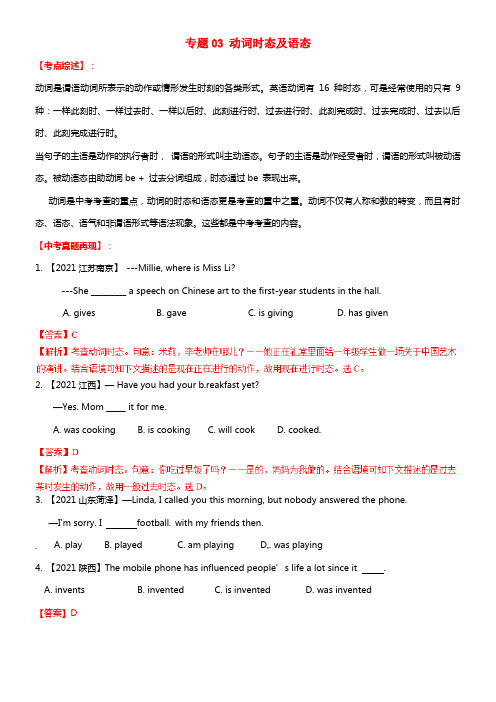
专题03 动词时态及语态【考点综述】:动词是谓语动词所表示的动作或情形发生时刻的各类形式。
英语动词有16种时态,可是经常使用的只有9种:一样此刻时、一样过去时、一样以后时、此刻进行时、过去进行时、此刻完成时、过去完成时、过去以后时、此刻完成进行时。
当句子的主语是动作的执行者时,谓语的形式叫主动语态。
句子的主语是动作经受者时,谓语的形式叫被动语态。
被动语态由助动词be + 过去分词组成,时态通过be 表现出来。
动词是中考考查的重点,动词的时态和语态更是考查的重中之重。
动词不仅有人称和数的转变,而且有时态、语态、语气和非谓语形式等语法现象。
这些都是中考考查的内容。
【中考真题再现】:1. 【2021江苏南京】---Millie, where is Miss Li?---She _________ a speech on Chinese art to the first-year students in the hall.A. givesB. gaveC. is givingD. has given2. 【2021江西】— Have you had your b reakfast yet?—Yes. Mom _____ it for me.A. was cookingB. is cookingC. will cookD. cooked3. 【2021山东菏泽】—Linda, I called you this morning, but nobody answered the phone.—I'm sorry. I football with my friends then.A. playB. playedC. am playingD. was playing4. 【2021陕西】The mobile phone has influenced people’s life a lot since it .A. inventsB. inventedC. is inventedD. was invented【答案】D【解析】考查动词时态及语态。
(人教版)中考英语总复习语法:专题8-动词的时态、语态(101页)

(2)过去完成时与现在完成时的主要区别是时间参 照点不同: 过去完成时的时间参照点是某个“过去的” 时间;现在完成时的时间参照点是“现在”。因此现在 完成时中的很多规则,也适用于过去完成时。 When I got to the cinema, the film had been on. 当我到达电影院时,电影已经开始了。
以辅音字母+y结尾的动词, 把y变为i再加-ed
以一个元音字母加一个辅音 字母结尾的重读闭音节词, 双写结尾字母再加-ed
study→studied carry→carried stop→stopped drop→dropped prefer→preferred
3.一般将来时 (1)表示将来某个时间要发生的动作或存在的状 态,其构成形式:“will/shall+动词原形”。常与表 示将来的时间状语tomorrow,next week,in+一段时 间等连用。 当主语是第一人称I或we时,问句中一般用shall。
③表单纯性的将来,与人的主观愿望和判断无关 时。 If it's made of wood, it will float on water. 这要是木材做的,它能浮在水面上。 (4)当主句为一般将来时态时,在if,as soon as, until, when等引导的状语从句中用一般现在时代替一 般将来时。 I will call you as soon as I get there. 我一到那儿就给你打电话。
特殊情况:have→has,am/are→is 考查热点:如果主句为一般将来时,if,unless等 引导的条件状语从句和when,until,as soon as等引导 的时间状语从句常用一般现在时表示将来。 What about going climbing if it doesn't rain tomorrow? 如果明天不下雨,去爬山怎么样?
专题10 动词的时态和语态(课件)-2024年中考英语复习(全国通用)

14.(2022·湖北武汉·统考中考真题)—I don’t think sixteen-year-olds should be allowed
to drive. —I ________. It’s not safe. A.agree B.agreed C.will agree
D.had agreed
apples in the fridge now.
A.is
B.are
C.was
D.were
【答案】A 【解析】句意:现在冰箱里有一些果汁和几个苹果。考查一般现在时及 “there be”。根据“now”,排除过去时态的CD,由于there be的就近原则, some juice不可数,所以应是is。故选A。
5.(2023·甘肃白银·校考一模)Thanks to those cleaners who ________ hard on the streets, we can have a beautiful city. A.work B.worked C.have worked D.were working
真理。
时态的辨析 满分秘籍
易失分点
提分特训
时态 谓语动词
意义
例句
一般
表示过去
过去 was/were,did 的动作或
时
状态。
When he was a child, he often swam in the river.当他小的时候,他经常在河里游泳。
16.(2023·江苏南通·统考一模)—What will the weather be like tomorrow? —I was on the phone and ________ most of the weather report. A.have missed B.was missing C.will miss D.missed
中考语法知识点归纳动词时态语态与非谓语动词
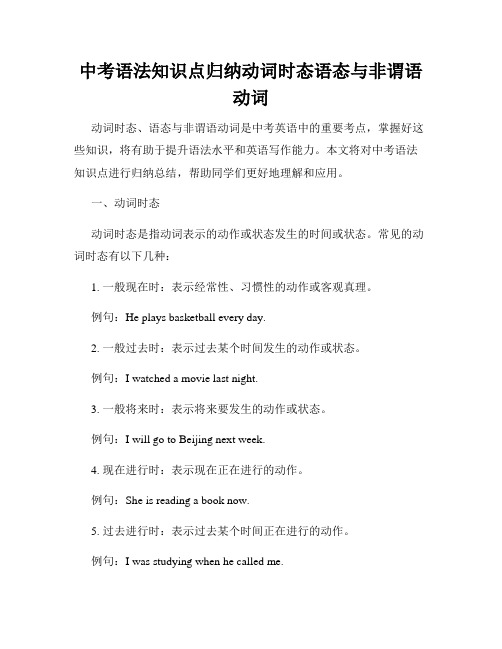
中考语法知识点归纳动词时态语态与非谓语动词动词时态、语态与非谓语动词是中考英语中的重要考点,掌握好这些知识,将有助于提升语法水平和英语写作能力。
本文将对中考语法知识点进行归纳总结,帮助同学们更好地理解和应用。
一、动词时态动词时态是指动词表示的动作或状态发生的时间或状态。
常见的动词时态有以下几种:1. 一般现在时:表示经常性、习惯性的动作或客观真理。
例句:He plays basketball every day.2. 一般过去时:表示过去某个时间发生的动作或状态。
例句:I watched a movie last night.3. 一般将来时:表示将来要发生的动作或状态。
例句:I will go to Beijing next week.4. 现在进行时:表示现在正在进行的动作。
例句:She is reading a book now.5. 过去进行时:表示过去某个时间正在进行的动作。
例句:I was studying when he called me.6. 现在完成时:表示过去的动作对现在造成的影响或结果。
例句:She has visited Paris three times.7. 过去完成时:表示对过去某个时间之前发生的动作进行的描述。
例句:They had already left when I arrived.二、动词语态动词语态是指动作发出的主体和动作所受的影响关系。
英语中常见的动词语态有以下几种:1. 主动语态:表示主语是动作的发出者。
例句:He fixed the car yesterday.2. 被动语态:表示主语是动作的承受者。
例句:The car was fixed by him yesterday.3. 进行时态:表示主语正在进行的动作处于进行状态。
例句:The book is being read by her.4. 完成时态:表示主语已经完成的动作处于完成状态。
例句:The book has been read by her.注意:被动语态需要根据动作的时态来变换,同时需要适当更改时态动词。
人教版英语九年级全册动词时态和语态知识点及相应习题
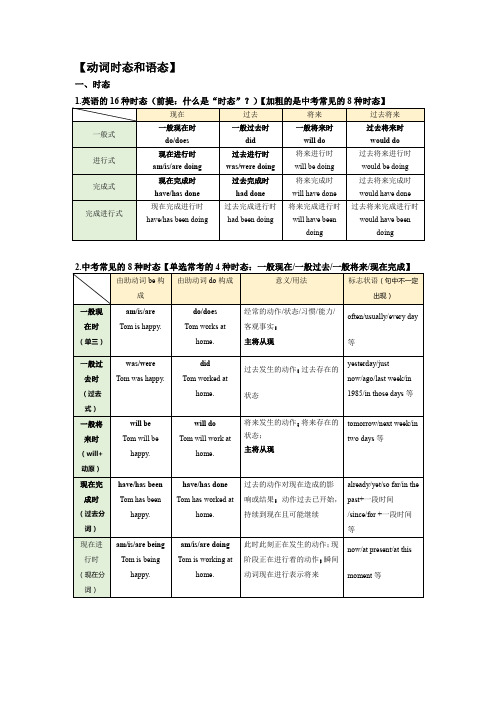
【动词时态和语态】一、时态3.主将从现(1)条件状语从句由if(如果)、as long as(只要)、unless(除非)引导,主句为一般将来时或表述将来含义,从句用一般现在时。
例如:She had better travel with a local tour guide if she wants to know more about the culture.(2)时间状语从句由when(当……时候)、as soon as(一……就……)、until(直到)等引导,主句为一般将来时或表述将来含义,从句用一般现在时。
例如:I’ll discuss this matter with you when we meet next time. / We won’t leave until Mary arrives.考点5 现在完成时have/has+(not+)过去分词(1)表示过去的动作对现在产生的结果和影响现在完成时表示过去某个时间曾经做过的、发生过的事情,对目前的某种影响,这时一般不用时间状语;也可以表示到目前为止没有发生或经历的事情。
The tickets have sold out.(票已售空。
)I have tried Italian food. It’s delicious!(我已经尝过意大利美食了。
美味啊!)Simon has seen the concert. He doesn’t want to see it again.(西蒙已经看过这场演唱会,不想再看了。
)I have never visited San Francisco in the U.S.A.(我从没去过美国的旧金山。
)(说明过去没有去过,现在仍没去过)I have just heard the news that our school will set up a press club.(我刚听到消息说我们学校要成立一个记者俱乐部。
2021年中考语法填空之动词时态和语态(无答案)

动词一、动词的时态和语态(一)一般现在时1、定义:经常性、习惯性的动作时间标志词:always, usually/often, sometimes, hardly, seldom, neverevery+时间once/twice/three times a+时间时间状语从句,条件状语从句中,主将从现2、考点动词原形(主语为一、二人称或者复数)实意动词动词三单(主语不是一二人称或者复数)Be动词am is are动词原形变三单的规则:1、+s2、小四吃烧饼(s, x, ch, sh, o)结尾+es3、辅音字母+y结尾,变y为i+es4、have----has3、被动语态:am/is/are+动词的过去分词(规则动词过去式和过去分词变化规则一样,不规则特殊记)练习:1、I (wash) my hair once a week.2、The train (leave) Jinan at five and (arrive) in Beijing at eleven.3、Students do less homework now. Usually it (finish)before 9 o’clock in the evening.4、Now smart phones (use)in many ways in our daily life.(二)一般过去时1、定义:过去发生的事情2、时间标志词:yesterdaylast+时间(last year)一段时间+ago (three days ago)in the past in+过去的年份3、考点:实意动词: 动词的过去式Be动词:was were(单数was,复数were)动词原形变一般过去式的规则:1、+ed2、以e结尾,直接+d3、辅音字母+y结尾,变y为i+es4、以辅元辅重读闭音节结尾,双写词尾+ed(travel------travelled )不规则变化:特殊记4、被动语态: was/were+动词的过去分词练习:1、I (receive) a strange phone call yesterday.2、I got up early, (wash)my face, (had) a quick breakfast and(hurry) to school.3、When marry was in the countryside, she often (swim) in the river.4、They (invite) her to the party, so she was very happy.5、It is said that potato chips (invent) by accident about a hundred years ago.6、Look at our new school, It (build)last year.7、The writer’s book (translate)into French as soon as it came out.(三)一般将来时1、定义:将要发生的事情时间标志词:tomorrownext+时间(next week)in+一段时间(in two years两年后)in+未来年份in the future2、考点:will+动词原形3、被动语态:will+be+动词过去分词练习:1、The president (visit) China next week.2、Please let me know when your father (come) home tonight.3、A supermarket (build) in 4 years.(四)过去将来时1、考点:would+动词原形2、被动语态:would be+动词的过去分词(五)现在进行时1、定义:正在发生的事情2、时间标志词:look、listen、now3、考点:am/is/are+V-ing形式动词原形变V-ing形式的规则:1、+ing2、以不发音的e结尾。
中考英语总复习 专题10 动词的时态和语态课件

归纳现在进行时的构成
主语+am/is/are+动词-ing形式
现在进行时的用法
1.表示(biǎoshì)现在(指说话人说话时)正在发生的事情。如: We are waiting for you. 我们正在等你。 2.表示当前一段时间内的活动或现阶段正在进行的动作。如: Mr.Green is writing another novel these days.
A.takes B.took
C.will take D.has taken
第五页,共二十三页。
归纳一般过去时的构成
主语+was/were/did+其他 一般过去时的用法 (1)表示过去某个时间或某一段时间内发生的动作或存在(cúnzài)的状 态。常见的时间状语有:yesterday,last week,an hour ago,the other day,in 1982等。如: Where did you go just now?
您还要些什么吗?
I wondered if you could help me. 我在想你能不能帮我一下。
②情态动词 could,would。如:
Could you lend me your bike? 你的自行车能借我用一下吗?
第七页,共二十三页。
(三)现在(xiànzài)进行时
第八页,共二十三页。
(一)常考的被动语态
A.Invites
C.was invited
B.is invited
D.has invited
第十八页,共二十三页。
2.(2017—2018学年(xuénián)安徽合肥蜀山50中西区第三次月考)If more salt
C to the soup,it will taste better. A.will add B.adds C.is added D.will be added 3.(2018·安徽合肥庐阳区二模,44)All the people I have known in the past three
中考英语(人教版)动词的时态和语态 (共114张PPT)

考点二 一般过去时 1.概念、句式结构及常用的时间状语 (1)概念:一般过去时表示过去某个时间所发生的动作 或存在的状态。
(2)句式结构(肯定句)有以下四种:
句式结构
例句
was/were+表语 She was a beautiful girl ten years ago. Her father was on business.
句式结构
例句
am/is/are+表语
She is a beautiful girl. Her father is always on business.
there is/are
There is a schoolbag on the desk. There are five people in my family.
(3)常用的时间状语有:yesterday(昨天), the day before yesterday(前天), last week(上星期), last month(上个月), last year(去年), two days ago(两天前), three years ago(三年 前), in 2001(在 2001 年), just now(刚才)等。
(3)描述客观真理、客观存在或科学事实等。 The light travels faster than the sound. 光比声音传播得快。 The sun rises in the east.太阳从东方升起。
注意 在宾语从句中,即使主句是一般过去时,但 从句表示客观真理、客观存在或科学事实时,从句依然用 一般现在时。
(根据汉语意思完成句子。) 如果我找到他的电话号码,我会告诉你。 If I find his phone number, I will tell you.
【火线100天】中考英语基础【语法9】动词的时态和语态(含答案)
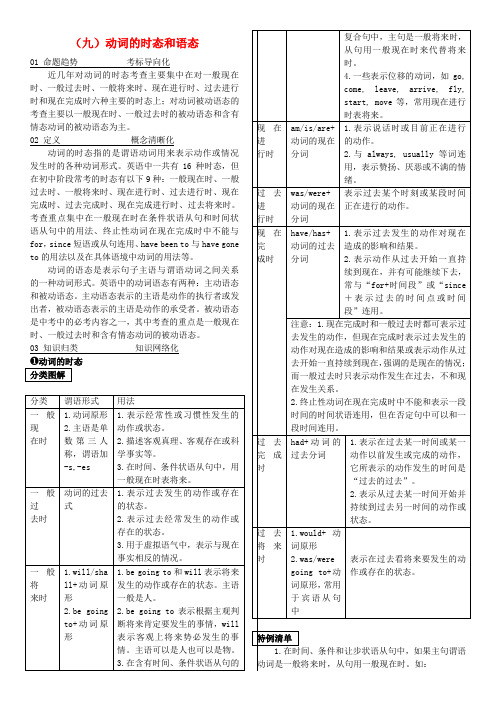
4.一些表示位移的动词,如go, come, leave, arrive, fly, start, move等,常用现在进行时表将来。
现在进
行时
am/is/are+动词的现在分词
1.表示说话时或目前正在进行的动作。
The next train leaves at 7 o’clock this evening.下一列火车将在今晚7点离开。
3.现在进行时与always, continually, forever等副词连用,表示反复出现或习惯性的动作,这种用法往往表达说话人的某种感情,如赞扬、遗憾、讨厌或不满等。如:
2.与always, usually等词连用,表示赞扬、厌恶或不满的情绪。
过去进
行时
was/were+动词的现在分词
表示过去某个时刻或某段时间正在进行的动作。
现在完
成时
have/has+动词的过去分词
1.表示过去发生的动作对现在造成的影响和结果。
2.表示动作从过去开始一直持续到现在,并有可能继续下去,常与“for+时间段”或“since+表示过去的时间点或时间段”连用。
(九)动词的时态和语态
01命题趋势考标导向化
近几年对动词的时态考查主要集中在对一般现在时、一般过去时、一般将来时、现在进行时、过去进行时和现在完成时六种主要的时态上;对动词被动语态的考查主要以一般现在时、一般过去时的被动语态和含有情态动词的被动语态为主。
02定义概念清晰化
动词的时态指的是谓语动词用来表示动作或情况发生时的各种动词形式。英语中一共有16种时态,但在初中阶段常考的时态有以下9种:一般现在时、一般过去时、一般将来时、现在进行时、过去进行时、现在完成时、过去完成时、现在完成进行时、过去将来时。考查重点集中在一般现在时在条件状语从句和时间状语从句中的用法、终止性动词在现在完成时中不能与for,since短语或从句连用、have been to与have gone to的用法以及在具体语境中动词的用法等。
中考英语 专题七 动词的分类、时态、语态、非谓语动词、情态动词

第一讲动词的分类动词是表示动作或状态的词。
句子中的谓语成分是由动词充当的,谓语通常是句中不可缺少的成分,因此动词是英语词类中最重要的一种。
动词可以通过本身的变化来表示动作发生的时间以及说话人的语气、态度等。
1.动词的种类动词按其词义和在句中的作用可以分为:行为动词(或称实义动词)、连系动词、助动词和情态动词。
1)行为动词又可分为及物动词(vt.)和不及物动词(vi.)两种。
及物动词作谓语,后面必须跟宾语意思才完整。
不及物动词作谓语,后面不能跟宾语,只有加上介词后才可接宾语。
2)英语中有些动词常常是既作及物动词又作不及物动词;既作连系动词工作及物动词。
例如:He speaks English very well. (vt.)He spoke at the meeting. (vi.)另外,动词按其在句中能否作谓语,又可分为谓语动词(finite verb)和非谓语动词(non-finite verb)两大类。
说明:谓语动词又称限定动词,非谓语动词又称非限定动词。
非谓语动词初中阶段主要学习动词不定式的用法。
2.动词的基本形式英语动词有五种基本形式,即动词原形、过去式、过去分词、现在分词和第三人称单数形式。
如:work—worked—worked—working—works。
它们的构成及说明:1)词尾-ed在清辅音后读[t];在浊辅音和元音后读[d];在[t]和[d]后读[id]。
2)词尾-es或-s在[s ]、[z]、[t ]、[d ]后面读[iz];在清辅音后读[s];在浊辅音及元音后读[z];在[t],[d]后读[ts]、[dz]。
3)不规则动词的过去式与过去分词则要根据不规则动词表逐渐记住。
第二讲动词的时态1.一般现在时1)构成动词一般现在时,除主语为单数第三人称以外,谓语动词一律用原形,若主语为第三人称单数,则谓语动词的词尾应发生变化(加-s或-es)。
另外be和have 有特殊的人称变化形式。
英语语法:初中英语动词时态和语态讲解
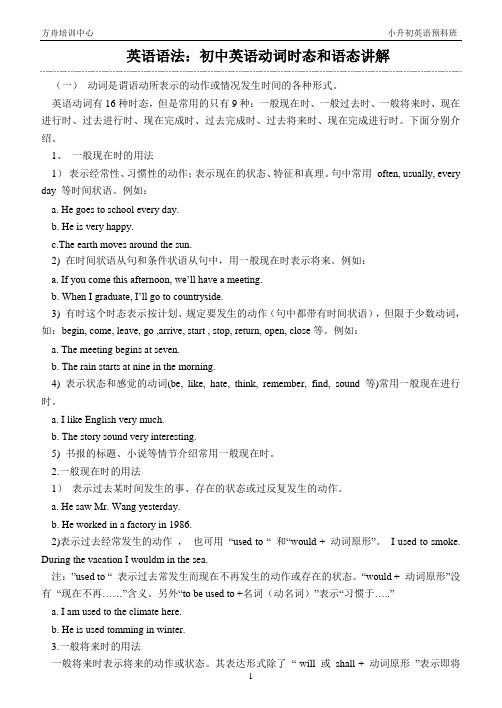
英语语法:初中英语动词时态和语态讲解(一)动词是谓语动所表示的动作或情况发生时间的各种形式。
英语动词有16种时态,但是常用的只有9种:一般现在时、一般过去时、一般将来时、现在进行时、过去进行时、现在完成时、过去完成时、过去将来时、现在完成进行时。
下面分别介绍。
1、一般现在时的用法1)表示经常性、习惯性的动作;表示现在的状态、特征和真理。
句中常用often, usually, every day 等时间状语。
例如:a. He goes to school every day.b. He is very happy.c.The earth moves around the sun.2) 在时间状语从句和条件状语从句中,用一般现在时表示将来。
例如:a. If you come this afternoon, we’ll have a meeting.b. When I graduate, I’ll go to countryside.3) 有时这个时态表示按计划、规定要发生的动作(句中都带有时间状语),但限于少数动词,如:begin, come, leave, go ,arrive, start , stop, return, open, close等。
例如:a. The meeting begins at seven.b. The rain starts at nine in the morning.4) 表示状态和感觉的动词(be, like, hate, think, remember, find, sound 等)常用一般现在进行时。
a. I like English very much.b. The story sound very interesting.5) 书报的标题、小说等情节介绍常用一般现在时。
2.一般现在时的用法1)表示过去某时间发生的事、存在的状态或过反复发生的动作。
a. He saw Mr. Wang yesterday.b. He worked in a factory in 1986.2)表示过去经常发生的动作,也可用“used to “ 和“would + 动词原形”。
初三英语中考专题复习---动词的时态和语态

The Past Continuous Tense
过去进行时用法
过时正进 I was doing my homework
at eight last night.
过段直进 They were watching TV from
nine to ten yesterday.
when, They were reading aloud while when the teacher came in.
5. By the time I was three, I _________ learning English. I’ve been learning it for 15 years.(2010 山东枣庄)
A. had finished B. had stopped C. had started
山东省中考真题
与 always
连用
My teacher is always smiling in class.
现在完成时
The Present Perfect Tense
现在完成时用法
I can’t find my pen. I have lost
过影响现 it.
Have you finished it yet ?
that night.
虚拟语气 If I were you, I would try again.
过去完成时
The Past Perfect Tense
过去完成时用法
过延到过 I had stayed in Beijing
for three years by then.
过去的过去
When plane
A. to lock B. work C. to work D lock
中考重点动词的时态和语态的转换

中考重点动词的时态和语态的转换动词的时态和语态是英语语法中十分重要的内容,对于中考来说也是一个重点考察的内容。
掌握动词时态和语态的转换规则,不仅能够提高语言表达的准确性,还能够在阅读和写作中更加灵活地运用。
本文将以中考重点动词为例,介绍其时态和语态的转换规则。
一、一般现在时态(Simple Present Tense)一般现在时表示经常性、习惯性的动作或状态,也用于客观事实和普遍真理等。
1. 肯定句形式:主语 + 动词原形(第三人称单数要加s或es)例:She often goes to school by bus.(她经常坐公交车去学校。
)2. 否定句形式:主语 + do not/does not + 动词原形例:They do not play football on weekends.(他们周末不踢足球。
)3. 疑问句形式:Do/Does + 主语 + 动词原形?例:Do you like swimming?(你喜欢游泳吗?)二、一般过去时态(Simple Past Tense)一般过去时表示过去某个时间点或某段时间里发生的动作或状态。
1. 肯定句形式:主语 + 动词过去式例:He lived in Beijing for five years.(他在北京住了五年。
)例:They did not go to the park yesterday.(他们昨天没有去公园。
)3. 疑问句形式:Did + 主语 + 动词原形?例:Did she watch a movie last night?(她昨晚看电影了吗?)三、现在进行时态(Present Continuous Tense)现在进行时表示当前正在进行的动作或为当前状态。
1. 肯定句形式:主语 + am/is/are + 动词的现在分词例:We are studying English now.(我们正在学习英语。
)2. 否定句形式:主语 + am/is/are not + 动词的现在分词例:She is not watching TV at the moment.(她此刻不在看电视。
- 1、下载文档前请自行甄别文档内容的完整性,平台不提供额外的编辑、内容补充、找答案等附加服务。
- 2、"仅部分预览"的文档,不可在线预览部分如存在完整性等问题,可反馈申请退款(可完整预览的文档不适用该条件!)。
- 3、如文档侵犯您的权益,请联系客服反馈,我们会尽快为您处理(人工客服工作时间:9:00-18:30)。
三、一般过去时
一般过去时的构成: ★ 动词的过去式 一般过去时的用法: ★表示过去发生的动作或状态.
用于一般过去时的时间状语有: yesterday, yesterday / morning /afternoon/evening, last night / week / month / Sunday / just now , half an hour ago等。
2.I’ll tell him the news as soon as he c_o_m__e_s(come) back.
3. If it d_o_e_s_n_’_t_r_a_in_ (not rain) tomorrow, we’ll go to the zoo.
4. Don’t get off the bus until it_st_o(psstop). 5. You may go out to play when you
I’m leaving on Sunday morning.
Jim is coming here this evening.
2016实战演练
1.Look! Some children a_r_e__p_la_y_i_n_g__ (play) football on the playground.
2.Listen ! Someone _i_s_p_l_a_y_i_n_g__ (play)
一、一般现在时
一般现在时的谓语构成: 1、be动词:am/is/are 2、行为动词:
A:动词原形 B:动词+-s (主语为单三)
一般现在时的用法: 1.经常发生,反复进行的动作或状态。 2.客观事实或普遍真理。 3.If ; as soon as;not …until 等引导的状 语从句。 4.当主句是祈使句或含有情态动词时
get married , in 1999 They got married in 1999.
the piano in the room. 3.The students of Class Twaor_e_w_o_r_k_i_n_g
(work) on the farm now. 4.Be quiet ! Your father__is__s_le_e_p_i_n_g__
(sleep). 5.Don’t go out ! It _is_r_a_i_n_i_n_g__ (rain )
---I think we’ll go if we d_o_n_’_t_h_a_v_e_ (not have) too much homework.
8. She watches TV twice a week. _H__o_w_ _o_f_t_e_n_ does she watch TV?
9. Jim has lunch at home everyday. (否定句) Jim _d_o_e_sn_’_t __h_a_v_e_ lunch at home
homework. ★Listen ! Someone is singing in the
next room. ★Don’t go out ! It’s raining hard
outside.
有些动词如come, go, leave, begin, 等的现在进行时可以表示 预定的或即将发生的动作,句中 常有表示将来的状语:
中考英语动词时态、语态、
一般现在时 ( The Simple Present tense 一般过去时 ( The Simple Past Tense ) 现在进行时(The Present Continuous Tense)
过去进行时(The Past Continuous Tense)
现在完成时(The Present Perfect Tense) 过去完成时 (The Past Perfect Tense) 一般将来时( The Simple Future Tense ) 过去将来时(The Simple Past Future Tense)
have a meeting, yesterday
We had a meeting yesterday.
give a concert, last month
Jay gave a concert last month.
join WTO , in 2001 China joined WTO in 2001.
everyday.
10. He does his homework every day. (一般疑问句)
_D_o_e_s__he __d_o_ his homework every day?
11. He has few friends, d_o_e_s__ ___h_e_ ? (反意疑问句)
二、现在进行时
__fi_n_i_sh___(finish) your homework.
6. The teacher told us that the earth __t_r_a_v_el_s__(travel) round the sun.
7. ---Do you know if we _w__il_l _g_o__(go) to the cinema tomorrow?
★现在进行时的谓语构成: am/is/are +动词ing
★现在进行时的用法:表示说 话时或现阶段正在进行或发 生的动作,
常与时间状语now, this week, these days 等连用。另外,我们还要注意 句中的隐含条件(如:look, listen, It’s nine o’clock等)。如: ★Look !The students are doing their
的从
always, sometimes everyday / week /
Sunday…
2016实战演练
1.Jim usually h_a_s_(have) lunch at home, but sometimes he __h_a_s_ (have) it at school.
